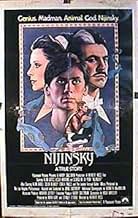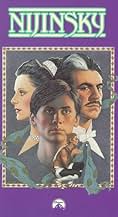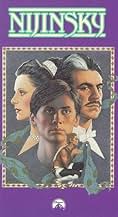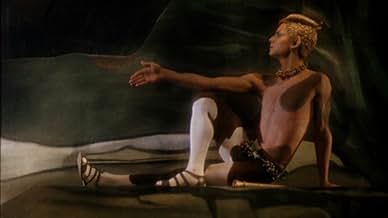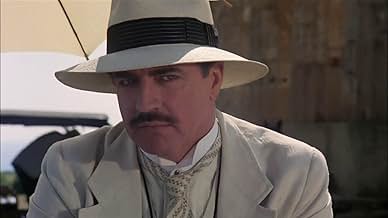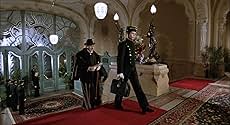The story of Vaslav Nijinsky, who is widely believed to be one of the greatest ballet dancers of all time. Based on Romola Nijinsky's "Last Years Of Nijinski.The story of Vaslav Nijinsky, who is widely believed to be one of the greatest ballet dancers of all time. Based on Romola Nijinsky's "Last Years Of Nijinski.The story of Vaslav Nijinsky, who is widely believed to be one of the greatest ballet dancers of all time. Based on Romola Nijinsky's "Last Years Of Nijinski.
- Director
- Writers
- Stars
Tomaso Milian Jr.
- Young Boy on Beach
- (as Tomas Milian Jr)
- Director
- Writers
- All cast & crew
- Production, box office & more at IMDbPro
Featured reviews
If you, like me, are a Nijinsky fan, go ahead and watch it
But I have some complaints
The film is great, don't get me wrong, but I felt like it lacked more simple scenes between Diaghilev and Nijinsky More on why they fell in love How it all started They focus a lot on the consequences of this, but not on the reasons of why it happened in the first place
I mean,yeah,love doesn't have a reason to happen and blah blah blah But when we start the movie, they already like each other Personally, I found the film a bit massive, as it lacks lighthearted scenes
I understand that they chose to focus on the tragedy, but if they really showed the reason that made Nijinsky stay, the love between them, I believe the moment where it all falls apart would be even better I would also have liked to have seen a scene of Nijinsky protecting Diaghilev, in addition to just Diaghilev protecting him, and to show Nijinsky's reaction to this protection, too More physical and emotional intimacy beyond arguments
Furthermore, they did not mention anything about WWI, which was a big reason for Nijinsky's downfall, as he was considered an enemy as he was in Belgium, due to his Russian citizenship
Despite this, overall, the film is great The costumes are realistic, the performances, in my opinion, are great and they managed to demonstrate the consequences very well, even with the lack of reasons.
The film is great, don't get me wrong, but I felt like it lacked more simple scenes between Diaghilev and Nijinsky More on why they fell in love How it all started They focus a lot on the consequences of this, but not on the reasons of why it happened in the first place
I mean,yeah,love doesn't have a reason to happen and blah blah blah But when we start the movie, they already like each other Personally, I found the film a bit massive, as it lacks lighthearted scenes
I understand that they chose to focus on the tragedy, but if they really showed the reason that made Nijinsky stay, the love between them, I believe the moment where it all falls apart would be even better I would also have liked to have seen a scene of Nijinsky protecting Diaghilev, in addition to just Diaghilev protecting him, and to show Nijinsky's reaction to this protection, too More physical and emotional intimacy beyond arguments
Furthermore, they did not mention anything about WWI, which was a big reason for Nijinsky's downfall, as he was considered an enemy as he was in Belgium, due to his Russian citizenship
Despite this, overall, the film is great The costumes are realistic, the performances, in my opinion, are great and they managed to demonstrate the consequences very well, even with the lack of reasons.
Acclaimed ballet dancer Vaslav Nijinsky, the "Polish peasant" who became the toast of Europe in the early 1900s, isn't very well served by this meandering biography which looks and sounds good but seems internally stultified. Nijinsky (played as a spoiled child by newcomer George De La Pena) attempts to extend his talents to the choreography of his latest showcase, under the tutelage of his lover and partner Sergei Diaghilev (Alan Bates), but cracks under the enormous pressure to be brilliant; meanwhile, a budding ballerina schemes her way into Nijinsky's arms after the star and his impresario have a romantic falling-out. Director Herbert Ross, apparently still riding the high from his 1977 ballet-themed drama "The Turning Point", has no new ideas on how to stage an electrifying or kinetic dance performance; the music direction is strong, however the magic of a timeless presentation is missing (what should have been the movie's strongest asset is in fact its weakest link). The temperament of artists in general is well-observed (if a bit over-the-top), however the love story between dancer and producer fails to come off. 1980 may still have been too early in the game to show passion between two men; Ross gives us a chaste rendering of it, followed by what seems like years of sniping and jealousy between the couple. Leslie Browne (a hold-over from "The Turning Point") never begins to suggest the cunning ambitions of a woman who hoped to 'change' Nijinsky', while the passion in that heterosexual union is confined to a single scene. What was everyone so bashful about? A brilliant little light show during the end credits is far more sparkling than anything in the rest of the film! *1/2 from ****
Purportedly factual biography of head strong and gay ballet dancer Nijinsky (George De La Pena). It deals with his slow descent into madness and his love for his manager (Alan Bates).
Lavish, well-done movie. I saw it way back in 1980 on opening night in a huge theatre in Boston. It was virtually empty. It was publicized to the hilt but it seems nobody had an interest in a ballet movie. Too bad. It was well-acted and the dancing by Pena was just superb.
My only complaint is the ridiculous R rating. It was given that because of a few (mild) kisses between Pena and Bates. Back in 1980 male on male kisses was enough to give a film an R rating and Hollywood wouldn't go any farther in portraying a gay relationship (purportedly Pena, who is straight, was petrified of doing these scenes). Everything else is PG material here. The rating really should be lowered for wider acceptance.
Worth catching.
Lavish, well-done movie. I saw it way back in 1980 on opening night in a huge theatre in Boston. It was virtually empty. It was publicized to the hilt but it seems nobody had an interest in a ballet movie. Too bad. It was well-acted and the dancing by Pena was just superb.
My only complaint is the ridiculous R rating. It was given that because of a few (mild) kisses between Pena and Bates. Back in 1980 male on male kisses was enough to give a film an R rating and Hollywood wouldn't go any farther in portraying a gay relationship (purportedly Pena, who is straight, was petrified of doing these scenes). Everything else is PG material here. The rating really should be lowered for wider acceptance.
Worth catching.
Saw this little seen film on Talking Pictures some weeks ago, in memory of Ronald Pickup who had died a couple of days before. There are a lot more interest points too about 'Nijinsky'. Am a massive classical music and ballet enthusiast, have been since six in regard to the latter (it's been lifelong with the former) when seeing 'Swan Lake' for the first time. The characters are also real life figures (not just Vaslav Nijinsky, but also Sergei Diaghliev and Igor Stravinsky), and the cast is an immensely talented one.
'Nijinsky' struck me as very interesting and generally well done. It is far from perfect (with a few major debits) and is far more successful in its depiction of the ballet world, the classical music and ballet and how influential it was back in the day than the biographical elements and the aspect that would have made it a brave film. Did though appreciate what 'Nijinsky' tried to do, and it is a shame that it is seen so little and only had a very mixed critical reception as it is better than that. Even if it did fall short of its full potential.
There are many things worth noting here in 'Nijinsky'. It is a beautiful looking film for one, the designers did their homework when it came to the handsome costumes in making them true to period. The production design doesn't look overblown or confined, just about opened up enough while not trying to do too much and being sumptuous and unforgiving. The photography likewise doesn't resort to gimmicks, that would have swamped and/or cheapened things, or look too stage-bound, anybody who loves endearingly old-fashioned period dramas will find that 'Nijinsky' reminds them of those. Only at the clumsily edited end of "Le Spectre De La Rose" does it disappoint.
Cannot say anything wrong about the music, all classical and ranging from Weber to Stravinsky, which is nothing short of outstanding and beautifully performed and used with some of the most ferocious uses of any Stravinsky piece on film. Debussy on film has seldom been more luminously seductive as well. The ferociousness of the Stravinsky is particularly evident in a truly harrowing sequence when "Rite of Spring" is rehearsed and the counting is all over the place, a sequence that might make one think twice about taking on ballet. Nor can be choreography or dancing be faulted, done how it would have been performed at the time, particularly good in the sensual choreography of "L'Apres Midi D'Un Faune" (in a performance that proved to be scandalous). The Rimsky Korsakov is also movingly done.
Enough of the story does intrigue and has a 'The Red Shoes' vibe in the dance sequences and first half. The film also captures very well the glamour and beauty of ballet but also its demanding nature and competitiveness, in a way that is very accurate (two of my sisters were ex-dancers). The character interaction is well done too, especially the tensions in rehearsals. The acting is very good, with Alan Bates in fact being truly excellent as Diaghliev. Making him monstrous but also human. Pickup is wonderfully eccentric as Stravinsky and George De La Pena is very committed in his portrayal of Nijinksy.
Unfortunately though, 'Nijinsky' could have been better than it was. Nijinsky's mental state and madness that features prominently later could have gone into much more depth, that did lack intensity and should have been a lot more harrowing and moving than it was. Also thought it skated over. More disappointing was the relationship between Nijinsky and Diaghliev, Bates and De La Pena have the chemistry but the film should have been a lot bolder in depicting this relationship. The representation here was so tame and cautious that one would not think that that would have been a shock, at a time where homosexuality was even more negatively thought of than it is now.
Most of the performances are very good, with the exception of Leslie Browne. For my tastes, she was very bland in a role that seemed underwritten. Some of the pace seemed over-deliberate.
In conclusion, interesting and underseen but for a film with a couple of controversial events it did feel too careful. 6/10.
'Nijinsky' struck me as very interesting and generally well done. It is far from perfect (with a few major debits) and is far more successful in its depiction of the ballet world, the classical music and ballet and how influential it was back in the day than the biographical elements and the aspect that would have made it a brave film. Did though appreciate what 'Nijinsky' tried to do, and it is a shame that it is seen so little and only had a very mixed critical reception as it is better than that. Even if it did fall short of its full potential.
There are many things worth noting here in 'Nijinsky'. It is a beautiful looking film for one, the designers did their homework when it came to the handsome costumes in making them true to period. The production design doesn't look overblown or confined, just about opened up enough while not trying to do too much and being sumptuous and unforgiving. The photography likewise doesn't resort to gimmicks, that would have swamped and/or cheapened things, or look too stage-bound, anybody who loves endearingly old-fashioned period dramas will find that 'Nijinsky' reminds them of those. Only at the clumsily edited end of "Le Spectre De La Rose" does it disappoint.
Cannot say anything wrong about the music, all classical and ranging from Weber to Stravinsky, which is nothing short of outstanding and beautifully performed and used with some of the most ferocious uses of any Stravinsky piece on film. Debussy on film has seldom been more luminously seductive as well. The ferociousness of the Stravinsky is particularly evident in a truly harrowing sequence when "Rite of Spring" is rehearsed and the counting is all over the place, a sequence that might make one think twice about taking on ballet. Nor can be choreography or dancing be faulted, done how it would have been performed at the time, particularly good in the sensual choreography of "L'Apres Midi D'Un Faune" (in a performance that proved to be scandalous). The Rimsky Korsakov is also movingly done.
Enough of the story does intrigue and has a 'The Red Shoes' vibe in the dance sequences and first half. The film also captures very well the glamour and beauty of ballet but also its demanding nature and competitiveness, in a way that is very accurate (two of my sisters were ex-dancers). The character interaction is well done too, especially the tensions in rehearsals. The acting is very good, with Alan Bates in fact being truly excellent as Diaghliev. Making him monstrous but also human. Pickup is wonderfully eccentric as Stravinsky and George De La Pena is very committed in his portrayal of Nijinksy.
Unfortunately though, 'Nijinsky' could have been better than it was. Nijinsky's mental state and madness that features prominently later could have gone into much more depth, that did lack intensity and should have been a lot more harrowing and moving than it was. Also thought it skated over. More disappointing was the relationship between Nijinsky and Diaghliev, Bates and De La Pena have the chemistry but the film should have been a lot bolder in depicting this relationship. The representation here was so tame and cautious that one would not think that that would have been a shock, at a time where homosexuality was even more negatively thought of than it is now.
Most of the performances are very good, with the exception of Leslie Browne. For my tastes, she was very bland in a role that seemed underwritten. Some of the pace seemed over-deliberate.
In conclusion, interesting and underseen but for a film with a couple of controversial events it did feel too careful. 6/10.
Nijinsky (1980) -
I couldn't actually remember whether I had checked the synopsis for this film beforehand and whether it might have been about a horse instead. My Mother certainly insisted on telling me that there was also a horse called Nijinsky all the way through it, despite it obviously being about the ballet dancer.
Either way, I knew nothing about the man, well played by George De La Pena and now I know something. He seemed like a bit of a diva actually and although it was clear that Sergei was using him for his talents, at least to some degree and that their love might not have been true, I felt that the dancer was probably doomed to come to the end that he did due to his passion and determination that would only ever be disappointed.
The character of Sergei, who was the lover and benefactor, didn't look like the Alan Bates I knew. I would still have kissed him though, without the use of a handkerchief between our lips, as was the oddity of their first meeting on screen.
There had always been something roguishly charming about Mr. Bates, especially when he had his beard and that came across in this great and interesting character, which was well delivered.
I would have liked to have seen more of Nijinsky actually dancing, although the Faun performance was a bit odd and lacklustre. More a sort of strange rolling around than the traditional beauty of a ballet that I'm used to. Actually, most of the dances were too strange for me and I was disappointed, having only recently started to get in to the art form via the likes of 'Swan Lake' and 'The Nutcracker', but also 'Car Men' and an old BBC2 performance I saw entitled 'Enter Achilles' from a season they did named '2 Dance'. Perhaps what was shown in this film would be received positively by those that knew more, but for myself as a layman it just came across as a bit forced and daft.
However I would have been very surprised if anyone could choreograph any kind of dance to Igor Stravinsky's (Ronald Pickup) God awful music, as it was performed in this film. It was painful to listen to.
Other than that, I thought that this story of Vaslav Nijinsky's life was produced fairly well. I would definitely have liked more sex and nudity, but I understood the restrictions that the studio would have been under at the time.
However I did also think that it was very poorly lit, making it very dark throughout and therefore lacking in definition at times, or perhaps it may have been the quality of the film used, but it definitely needed something.
In general it was interesting and it kept my attention, which many other films have failed to do. The final moments appeared a bit rushed as if they had sacrificed filming that segment of his life due to time constraints, because it was sad and that did lead me to thinking that it was a poor end for both Nijinsky and the film.
640.89/1000.
I couldn't actually remember whether I had checked the synopsis for this film beforehand and whether it might have been about a horse instead. My Mother certainly insisted on telling me that there was also a horse called Nijinsky all the way through it, despite it obviously being about the ballet dancer.
Either way, I knew nothing about the man, well played by George De La Pena and now I know something. He seemed like a bit of a diva actually and although it was clear that Sergei was using him for his talents, at least to some degree and that their love might not have been true, I felt that the dancer was probably doomed to come to the end that he did due to his passion and determination that would only ever be disappointed.
The character of Sergei, who was the lover and benefactor, didn't look like the Alan Bates I knew. I would still have kissed him though, without the use of a handkerchief between our lips, as was the oddity of their first meeting on screen.
There had always been something roguishly charming about Mr. Bates, especially when he had his beard and that came across in this great and interesting character, which was well delivered.
I would have liked to have seen more of Nijinsky actually dancing, although the Faun performance was a bit odd and lacklustre. More a sort of strange rolling around than the traditional beauty of a ballet that I'm used to. Actually, most of the dances were too strange for me and I was disappointed, having only recently started to get in to the art form via the likes of 'Swan Lake' and 'The Nutcracker', but also 'Car Men' and an old BBC2 performance I saw entitled 'Enter Achilles' from a season they did named '2 Dance'. Perhaps what was shown in this film would be received positively by those that knew more, but for myself as a layman it just came across as a bit forced and daft.
However I would have been very surprised if anyone could choreograph any kind of dance to Igor Stravinsky's (Ronald Pickup) God awful music, as it was performed in this film. It was painful to listen to.
Other than that, I thought that this story of Vaslav Nijinsky's life was produced fairly well. I would definitely have liked more sex and nudity, but I understood the restrictions that the studio would have been under at the time.
However I did also think that it was very poorly lit, making it very dark throughout and therefore lacking in definition at times, or perhaps it may have been the quality of the film used, but it definitely needed something.
In general it was interesting and it kept my attention, which many other films have failed to do. The final moments appeared a bit rushed as if they had sacrificed filming that segment of his life due to time constraints, because it was sad and that did lead me to thinking that it was a poor end for both Nijinsky and the film.
640.89/1000.
Did you know
- TriviaExecutive Producer Harry Saltzman had wanted to make a movie about Nijinsky for many years, first attempting to produce a version in 1970 with partner Albert R. Broccoli. The movie was started, but was never finished, it being cancelled by Broccoli and Saltzman. It is known as Nijinsky: Unfinished Project (1970). It starred Rudolf Nureyev, was written by Edward Albee, and directed by Tony Richardson.
- How long is Nijinsky?Powered by Alexa
Details
Box office
- Gross US & Canada
- $1,047,454
- Gross worldwide
- $1,047,454
- Runtime
- 2h 9m(129 min)
- Color
- Sound mix
- Aspect ratio
- 1.85 : 1
Contribute to this page
Suggest an edit or add missing content



